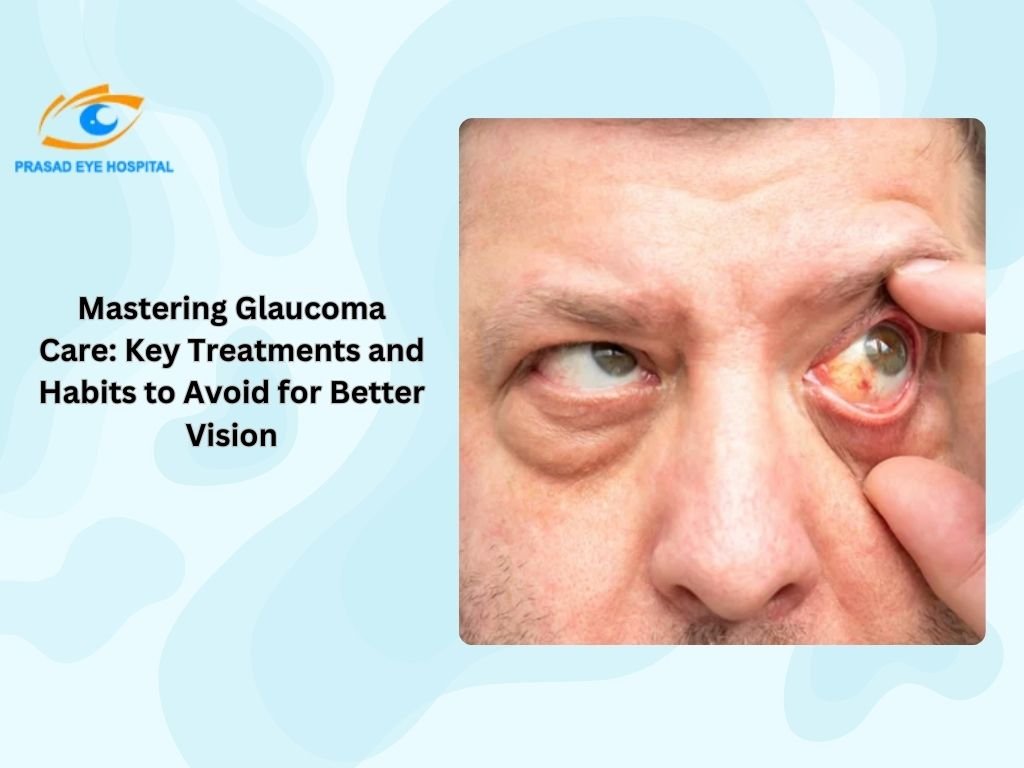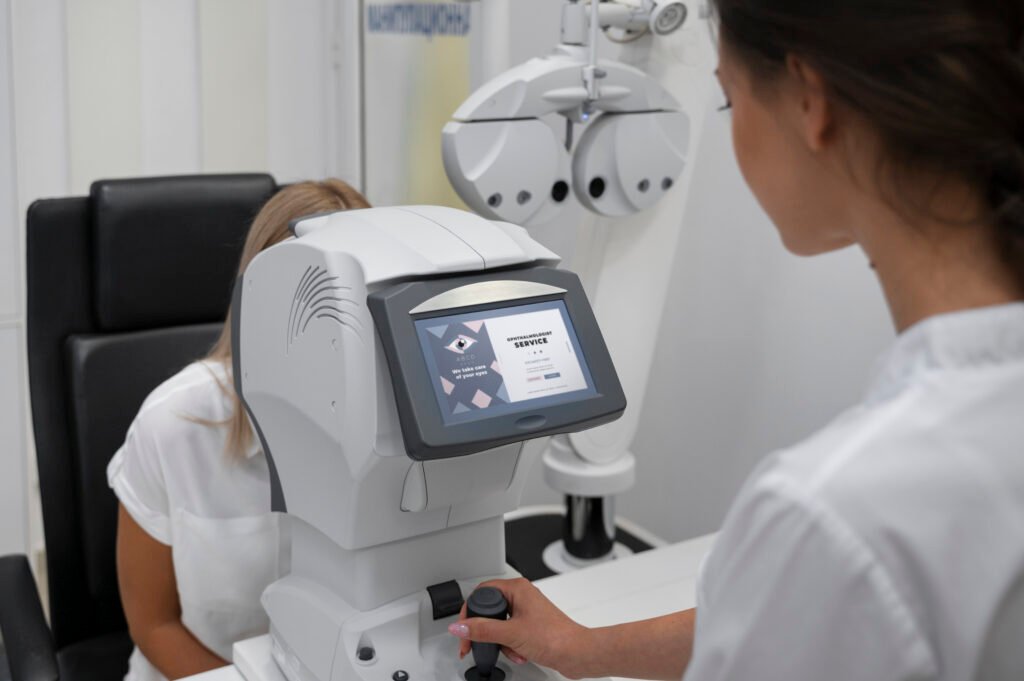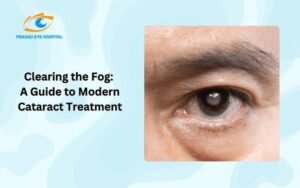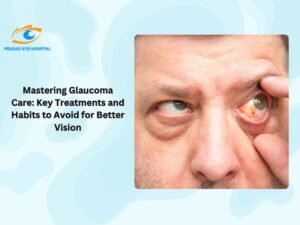
Table of Contents
When it comes to eye health, glaucoma is one of the most serious and challenging conditions to manage. Known as the “silent thief of sight,” glaucoma gradually damages the optic nerve, potentially leading to irreversible vision loss. For those diagnosed, effective management is crucial to preserving vision. In this guide, we’ll explore key treatments and habits to avoid for better eye health. This information is provided by Prasad Eye Hospital, where Dr. Indranath Prasad, a leading glaucoma specialist in Ramgarh, Jharkhand, offers expert care to protect your vision.
Understanding Glaucoma: An Overview
Glaucoma is a group of eye conditions that damage the optic nerve, often due to increased intraocular pressure (IOP), and is a leading cause of blindness, especially in older adults. The two main types are Open-Angle Glaucoma, where fluid drainage is slow, causing gradual pressure build-up, and Angle-Closure Glaucoma, where fluid drainage is suddenly blocked, leading to rapid pressure increase and potential vision loss. Risk factors include age, family history, ethnicity, and and conditions like diabetes. Early detection and treatment are crucial to prevent significant vision loss.
Key Treatments for Glaucoma
Medications

Medications are often the first line of treatment for glaucoma. These typically come in the form of eye drops designed to either reduce the production of aqueous humor (the fluid in the eye) or increase its outflow, thereby lowering intraocular pressure (IOP).
Laser Therapy
Laser treatments are a common next step when medications do not sufficiently control IOP. The most widely used laser treatments include:
- Laser Trabeculoplasty: Often used for open-angle glaucoma, this procedure improves the drainage angle’s function, helping fluid leave the eye more effectively.
- Laser Iridotomy: This is typically used for angle-closure glaucoma and involves creating a small hole in the iris to improve fluid drainage.
- Cyclophotocoagulation: This laser treatment reduces the eye’s fluid production by targeting the ciliary body, a part of the eye that produces aqueous humor.
Surgical Options
When medications and laser treatments do not achieve desired results, surgery may be necessary. Several surgical procedures can help control glaucoma by improving fluid drainage from the eye:
- Trabeculectomy: The most common glaucoma surgery, where a surgeon creates a new drainage pathway to allow fluid to leave the eye, reducing IOP.
- Glaucoma Drainage Devices: Also known as shunts or tubes, these devices are implanted in the eye to help fluid drain, lowering IOP.
- Minimally Invasive Glaucoma Surgery (MIGS): These newer procedures are less invasive than traditional surgeries, with faster recovery times. Examples include the iStent and the Trabectome.
Advanced Therapies
In recent years, research has led to the development of more advanced treatments, including:
- Gene Therapy: Still largely experimental, gene therapy aims to address the genetic causes of glaucoma to prevent optic nerve damage.
- Stem Cell Therapy: Another area of ongoing research, this therapy focuses on regenerating damaged optic nerve cells to restore vision.
Habits to Avoid for Better Vision in Glaucoma Patients

Skipping Medication or Inconsistent Use
One of the most common and detrimental mistakes glaucoma patients make is skipping medications or using them inconsistently. Eye drops and other medications must be taken as prescribed to effectively manage IOP. Skipping doses can lead to spikes in eye pressure, increasing the risk of vision loss.
Neglecting Regular Eye Exams
Regular eye exams are crucial for monitoring the progression of glaucoma and adjusting treatment as necessary. Even if your glaucoma is well-controlled, skipping follow-up appointments could lead to missed changes in your condition, putting your vision at risk.
Overindulging in Caffeine
While a cup of coffee won’t hurt, excessive caffeine intake can temporarily raise eye pressure, which may be harmful to those with glaucoma. It’s advisable to limit caffeine consumption to moderate levels.
Smoking
Smoking has been linked to a variety of health issues, including an increased risk of glaucoma. The chemicals in tobacco can contribute to optic nerve damage and worsen the progression of the disease.
Not Managing Other Health Conditions
Conditions such as hypertension, diabetes, and sleep apnea can negatively impact glaucoma. Poorly controlled blood pressure or blood sugar levels can increase the risk of optic nerve damage. It’s essential to manage these conditions alongside your glaucoma treatment.
Ignoring Physical Activity
Regular exercise is beneficial for overall health and can help lower eye pressure. However, certain activities that involve straining or head-down positions (like heavy weightlifting or yoga poses) should be avoided or modified, as they can increase IOP.
Poor Diet Choices
A diet high in saturated fats and sugar can contribute to inflammation and worsen glaucoma. Instead, focus on a diet rich in antioxidants, such as leafy greens, fruits, and fish high in omega-3 fatty acids, to support eye health.
Excessive Stress
Chronic stress has been linked to increased IOP and can exacerbate glaucoma symptoms. Practicing stress management techniques such as mindfulness, meditation, or yoga can be beneficial.
The Role of Dr. Indranath Prasad in Glaucoma Care
Choosing the right specialist is crucial in managing glaucoma effectively. Dr. Indranath Prasad, a highly experienced Phaco & Glaucoma Surgeon and a leading glaucoma specialist in Ramgarh, Jharkhand, plays a pivotal role in providing comprehensive glaucoma care. With his extensive expertise, Dr. Prasad offers personalized treatment plans that cater to the unique needs of each patient.
Why Choose Prasad Eye Hospital?

Prasad Eye Hospital is a leader in eye care, known for its cutting-edge technology and patient-centered approach. The hospital’s team, led by Dr. Indranath Prasad, a renowned glaucoma specialist in Ramgarh, Jharkhand, specializes in treating glaucoma with a comprehensive approach that includes both traditional and advanced therapies.
Key Benefits of Choosing Prasad Eye Hospital:
- Advanced Diagnostic Tools: The hospital uses the latest in diagnostic technology to accurately assess the severity of glaucoma and monitor its progression.
- Personalized Treatment Plans: Dr. Prasad and his team develop customized treatment plans tailored to each patient’s specific condition and lifestyle.
- Patient Education: Understanding your condition is vital for effective management. Prasad Eye Hospital emphasizes patient education, ensuring that you are informed about your treatment options and how to manage your condition at home.
- Holistic Care Approach: Beyond medical treatment, the hospital offers guidance on lifestyle changes that can support eye health, such as diet, exercise, and stress management.
Conclusion
Glaucoma is a serious condition that requires diligent management to preserve vision. By understanding the available treatments and avoiding habits that could worsen the condition, patients can significantly improve their quality of life. Under the care of a skilled glaucoma specialist in Ramgarh, Jharkhand, like Dr. Indranath Prasad at Prasad Eye Hospital, you can take proactive steps toward maintaining your vision and overall eye health.
FAQs
The best type of doctor for managing glaucoma is an ophthalmologist, specifically one who specializes in glaucoma treatment. An experienced glaucoma specialist, like Dr. Indranath Prasad at Prasad Eye Hospital in Ramgarh, Jharkhand, is trained to diagnose, monitor, and treat all forms of glaucoma. They can provide advanced care, including medical, laser, and surgical treatments, to help preserve your vision and manage the condition effectively.
Currently, there is no permanent cure for glaucoma. However, with early detection and proper management, glaucoma can be effectively controlled to prevent further vision loss. At Prasad Eye Hospital, Dr. Indranath Prasad offers comprehensive glaucoma treatment plans tailored to each patient’s needs, aiming to maintain optimal eye health and quality of life despite the condition.
Optometrists can help in the early detection and management of glaucoma, particularly through regular eye exams and monitoring intraocular pressure. However, for specialized glaucoma treatment, it is recommended to consult an ophthalmologist who focuses on glaucoma care. Dr. Indranath Prasad, a leading glaucoma specialist at Prasad Eye Hospital, provides advanced treatment options for those diagnosed with glaucoma, ensuring expert care and the best possible outcomes.






